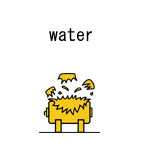| Case Name |
Leakage of a newly constructed floating roof tank caused due to damage to a base plate during a water leak test |
| Pictograph |

|
| Date |
July 8, 1968 |
| Place |
Ichihara, Chiba, Japan |
| Location |
Refinery |
| Overview |
On July 8th, 1968. A newly constructed 65000 kL tank sank unevenly during the first leak test by filling water. During removing sand of the high part of the foundation with the tank full of water, the base plate broke and a large volume of water flowed out. Part of the foundation supporting the base plate was detached, and the base plate was cracked by stress concentration. The water that flowed from there washed away earth and sand, and the crack in the base plate expanded. |
| Incident |
The foundation of a tank sank unevenly 250 mm during a leak test by filling water into a new 65000 kL crude oil tank. When base adjustment started with the tank full of water, four days later the base plate broke into nine pieces, and the tank ruptured. A large volume of earth and sand just under the tank flowed out. |
| Processing |
Storage |
| Substance |
Water |
| Type of Accident |
Leakage |
| Sequence |
On July 5th, 1968. The tank sank unevenly during a leak test by filling water into the new tank. Sand of the part of the high foundation was removed.
On July 6th. Holiday.
On July 7th. Sand was removed again.
About 3:00 on July 8th. The base plate of the tank broke.
The depth of the hole under the tank was about 5 m. An outflow of earth and sand was 3000 to 4000 cubic meters. A temporary hut and construction machines were washed away. |
| Cause |
As the part underneath the side wall of the tank was dug when the tank was full of water, high stress occurred at the annular wall, and it cracked. The foundation was softened by leakage of water from cracks, and the strength of the support decreased. Therefore, the base plate sank locally and membrane stress exceeded the tolerance, and resulted in a rapid fracture.
The method to equalize the foundation using the deadweight was unsuitable.
Refer to Fig2. |
| Countermeasures |
Probably, the planning system for maintenance needs to be considered again.
Do not induce excessive loads in a structure.
The differential settlement cannot be considered as a result of the leak test. Probably, at the construction stage, some mistake must have been made. It is most important to improve the construction program and construction capability before reviewing the maintenance system. |
| Knowledge Comment |
During difficult work, omission or simplification of work tends to occur. |
| Background |
There was a mistake in the repair plan. As the repair was hurried, it is thought that the plan was not fully discussed. The strength of the base plate is premised on the existence of the foundation. If support is lost locally, naturally stress will concentrate. |
| Incidental Discussion |
The reason why uneven sinking of the tank occurred just after completion is not understandable.
Why did they think it is possible to equalize the height by placing a weight on the solid foundation, which is not gas or liquid, after digging a slot with a width of 100 mm and a depth of 50 mm?
Soil is not gas or liquid. |
| Reason for Adding to DB |
Example of tank damage caused due to an unreasonable repair plan |
| Scenario |
| Primary Scenario
|
Organizational Problems, Inflexible Management Structure, Reduction in Schedule Prior, Poor Value Perception, Poor Safety Awareness, Inadequate Risk Recognition, Insufficient Analysis or Research, Insufficient Practice, Lack of Imagination, Planning and Design, Poor Planning, Poor Construction Method Planning, Usage, Maintenance/Repair, Wrong Repair Method, Failure, Large-Scale Damage, Tank Breakage, Loss to Organization, Economic Loss, 65000 kL Floating Tank Destructed Completely
|
|
| Sources |
Asamichi Kamei, Case of damage to oil tank and preventive measure, Accident examples with fire and explosion, The Japan Soc. for Safety Engineering edition, pp.172-179 (2002).
High Pressure Gas Safety Inst. of Japan, Outline of survey result for Chiba complex at protection research report, pp.48-49 (1978).
|
| Multimedia Files |
Fig2.Modification method for differential settlement
|
| Field |
Chemicals and Plants
|
| Author |
ITAGAKI, Haruhiko (Japan National Institute of Occupational Safety and Health)
TAMURA, Masamitsu (Center for Risk Management and Safety Sciences, Yokohama National University)
|
|